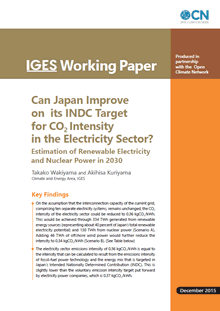Global electricity review 2024
Renewables generated a record 30 percent of global electricity in 2023, driven by growth in solar and wind especially from China, according to the Global Electricity Review 2024 released by the global
Renewables generated a record 30 percent of global electricity in 2023, driven by growth in solar and wind especially from China, according to the Global Electricity Review 2024 released by the global
The transition from fossil fuels to cleaner, safer energy technologies is under way. To pinpoint where decarbonization is happening most rapidly—and to extract lessons and best practices that can be applied
Tracking progress in the transition to low-carbon energy systems, including action taken through countries’ Nationally Determined Contributions (NDCs), is necessary to focus attention on the steps needed

This paper assesses the potential for improving the CO2 intensity of Japan’s electricity sector—the units of carbon dioxide emitted per units of electricity generated—by examining the potential for the

India requires a whopping $2.8 trillion investment to meet its growing energy needs in the coming years, with 75 percent of that for the power sector, a special report by the International Energy Agency
Question raised in Rajya Sabha on Intended Nationally Determined Contributions on reducing emission, 30/11/2015. India is a Party to the United Nations Framework Convention on Climate Change (UNFCCC) which
Question raised in Rajya Sabha on Target of cutting emission level by 2030, 30/11/2015. India is a party to the United Nations Framework Convention on Climate Change (UNFCC). All Parties under UNFCCC have
This report presents the Committee’s advice on the fifth carbon budget, covering the period 2028-32, as required under Section 34 of the Climate Change Act 2008. The Committee recommends that the fifth
In 2014, the growth in global CO2 emissions from fossil fuel use and cement production slowed down to only 0.5% compared to 2013, while the world’s economy grew by 3%, showing a partial decoupling of CO2
Emission reductions from renewables, coupled with energy efficiency improvements, must be at the heart of any effort to limit global temperature rise to two degrees Celsius, according to a report released
A new report — “How Energy Efficiency Cuts Costs for a 2° C Future” — analyzes how energy efficiency policies and programs in Brazil, China, Europe, India, Mexico, and the U.S. can reduce the cost of economy-wide